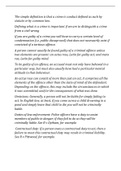The simple definition is that a crime is conduct defined as such by
statute or by common law.
Defining what is a crime is important if we are to distinguish a crime
from a civil wrong
If you are guilty of a crime you will have to carry a certain level of
condemnation (i.e. public dissaproval) that does not necessarily exist if
convicted of a tortious offence.
A person cannot usually be found guilty of a criminal offence unless
two elements are present: an actus reus, Latin for guilty act; and mens
rea, Latin for guilty mind.
To be guilty of an offence, an accused must not only have behaved in a
particular way, but must also usually have had a particular mental
attitude to that behaviour.
An actus reus can consist of more than just an act, it comprises all the
elements of the offence other than the state of mind of the defendant.
Depending on the offence, this may include the circumstances in which
it was committed, and/or the consequences of what was done.
Omissions: Generally, a person will not be liable for simply failing to
act. In English law, at least, if you come across a child drowning in a
pond and simply leave that child to die you will not be criminally
liable.
Duties of law enforcement: Police officers have a duty to assist
members of public in danger; if they fail to do so they will be
criminally liable. See R v Dytham, for example.
Contractual duty: If a person owes a contractual duty to act, then a
failure to meet this contractual duty may result in criminal liability.
See R v Pittwood, for example.






